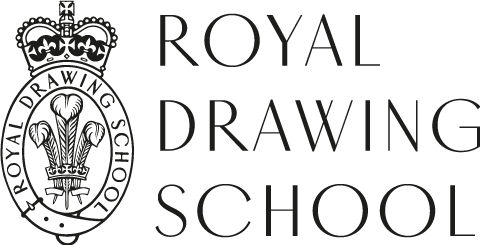Alicja Biała
The Drawing Year 2022
MFA, The Royal College of Art.

What were you doing before The Drawing Year and what drew you to apply?
At the time of applying to RDS, I was actually studying at The Royal College of Art, after having completed previous studies in Denmark, worked various jobs, and completed several large commissions. But I was not satisfied with the quality of my education, and I felt in my work in general something beneath it was missing. One of my tutors at RCA told me about RDS and I applied with the aim to find that fluency in drawing that I could feel in my hands every day.
Tell us about your practice and the part that drawing plays...I was born in Poland, and I studied in Denmark and the UK. I work across media and scales, ranging from architectural sculptures, large interior sculptural lighting, etchings, paintings, and more. No matter the medium, my work incorporates a mixture of pagan themes that bring the political and personal spheres of contemporary life into close proximity. At some point, I realised that no matter what I do – sculpture, painting, book cover, etc. – it always begins with a drawing.

Which courses have most impacted your practice?
I think it is too soon to say. For now, I would say the classes that had me drawing outside the classroom. Those were the classes that made me the most uncomfortable, yet ultimately taught me to be braver about sketching in public spaces and to make mistakes in front of others. It also taught me to have a sketchbook at all times and practice constantly. Sounds obvious but I had never done that before.
Which tutors have you most enjoyed working with and why?
Every single one of them really, but I’m madly in love in particular with Ishbel Myerscough, Mark Cazalet, Marcus Cornish, Rossen Daskalov, Martin Shortis and Robert Dukes. They all represent in different ways a mix of absolute professionalism, knowledge, ability to tell stories, sense of humour... And then there is this absolute kindness and visible enjoyment in teaching; Mark and Ishbel in particular would always (always!) carry smiles in the corners of their eyes – what a perfect invitation to be vulnerable, speak your worries, seek support – that’s what teaching should be about. I so much appreciate every conversation and every little remark.

What are the most important things that you've learned during the year?
I have learned how to say, “I don’t know” and I would say I used to have a pretty serious problem admitting that and not running away from it. I have learned discipline and the idea of drawing not to produce but to practise. I wish I had learned more to focus and stay still; I suppose that will come with time.
What has surprised you about The Drawing Year?
Simultaneously how bad I am at drawing and how good I can be. And then – a banal realisation – that not every drawing has to be good but should be attempted.
What is it like to study and live in London?
London is one of the greatest places I have lived in Europe. It is dynamic, diverse, and mad. But it also provides a reality check in terms of finances and the intensity of a metropolitan lifestyle. During my studies, I found myself sharing a bedroom, at other times living in places without heating, and even living in a room without windows. It was honestly brutal and difficult at times. But also – the buzz and excitement and memories, and importantly the growth – it was ultimately worth it. My advice for living in London: work out your living situation carefully, and hunt for as many grants and scholarships as you can - they will allow you to focus on your studies and not get swept away by the realities of city life.

What opportunities have arisen due to The Drawing Year?
Quite a few, and I imagine they will continue to develop. I have made connections with galleries, collectors and follow-up residencies, and I just feel way better connected overall to the UK scene.
What are you going on to do after completing the course?
I am currently artist in residence at Dumfries House, another opportunity for RDS alumni. Other than that, I am working on new commissions, and I am preparing several group shows and a solo show, all in different countries. It is a good time, and fast paced, which I like. But admittedly, I am missing tutorials.
What does it mean to you that the course has no fees and a free studio space?It is an unique opportunity and otherwise I would not be able to do the course. I think a lot of people forget that education in the EU is often free and most good art schools have no fees. If London is to be a cultural centre full of diversity, it should be the norm. The Royal Drawing School has felt like a gift, and to have been given a full scholarship demonstrated that there are people who actually believe in me and support my development, as well as appreciate art and its mastery as a whole. That is quite special.

What advice would you give to someone considering applying for the course?
If you are able to focus on just the RDS course, other things can (and should) wait. If I were to do the course again, I would focus beforehand on more grants/scholarships and come with sufficient finances, in order to allow myself to focus entirely on The Drawing Year and cut out any other noise. The full immersion is so worth it.
